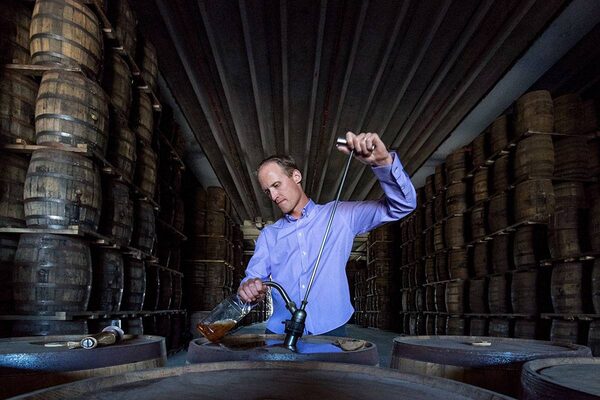
Don Livermore, master blender for J.P. Wiser’s and one of a few people in the world with a PhD in brewing and distilling.
As far as international trade routes go, the approximately 800 metres of water that separates Windsor, Ont., from its American neighbour, Detroit, might be among the more storied.
These days it is known as the busiest border crossing in North America, accounting for about 25 per cent of all trade between Canada and the United States.
But go back almost a century, to the 1920s and the American Prohibition era, and the Detroit River, or the "River of Booze" as it was known, was said to account for 75 per cent of all the alcohol smuggled into the U.S.
While the importance of that crossing has diminished somewhat following the repeal of Prohibition in 1933, Canada's reliance on the U.S. as a trade partner for its spirits has continued on.
As an export industry that accounted for almost $640-million last year, according to Statistics Canada, Canadian spirits far outstripped the likes of beer and wine to represent 68 per cent of all alcohol exported from this country.
Crown Royal
Leading that charge is Canadian whisky, which has experienced something of a revival in recent years, highlighted by Crown Royal's Northern Harvest being named world whisky of the year in 2016.
Its biggest consumer continues to be the United States, which purchases 69 per cent of all Canadian whisky, according to Spirits Canada. Indeed, Crown Royal, which is produced in Manitoba by global alcohol behemoth, Diageo PLC, is the top selling Canadian whisky in America.
At Toronto-based Corby Spirit and Wine Ltd., which accounts for 21 per cent of all spirits sold in Canada, the United States is one of the major markets it is focusing on, along with overseas countries such as Britain, Germany and France.
These are "all markets where there's a strong, established whisky consumer," says Patrick O'Driscoll, the chief executive officer for Corby.
The last 12 months have been a banner year for Corby, which recently saw its J.P. Wiser's 35 Years Old named Canadian whisky of the year at last month's Canadian Whisky Awards. In addition, the Windsor, Ont., distillery where it is produced – Hiram Walker and Sons Ltd. – which Corby manages, was named distillery of the year.
Domestic versus export
Balancing both domestic and export strategy can prove tricky in the alcohol business, though, in part due to the levels of taxation applied to the products. Mr. O'Driscoll says that for every bottle of whisky sold in Ontario, for example, 77 per cent of the retail price goes to the government, leaving 23 per cent to cover off costs like ingredients, production, staffing and marketing.
"The problem is then there's not a lot left over to be able to invest and if you want to break open new markets, you need to invest," he says.
He puts the blame for that more on Ottawa than the province, however.
"Continuing … to push up excise tax year after year is not helpful, I would say, to developing our national spirit in overseas markets," he says.
One of the principal tactics that Corby, and many other whisky producers, use to break into new markets is through the use of brand ambassadors, who are basically whisky experts who travel around to stores, shows and bars to educate new consumers about the product.
Given that many consumers are looking for products that have what he calls "genuine stories behind them," that approach can pay key dividends. For instance, Corby is fortunate to be able to call on Don Livermore, master blender for J.P. Wiser's and one of a few people in the world with a PhD in brewing and distilling.
"People like Don are fantastic secret weapons," Mr. O'Driscoll adds. "They know more about whisky and Canadian whisky in their little finger than many will learn all their lives."
The use of brand ambassadors to break new markets, both at home and abroad, is a tactic that other Canadian whisky producers also embrace.
Canadian Club
Tish Harcus, who just started her 30th year with Canadian Club, is the brand's global ambassador. Based in Windsor, Ms. Harcus says that when she started out, just having someone show the brand on TV or in a magazine was enough to attract sales. Not any more.
"The most important thing that us people in the whisky-making industry can do is get liquor to lips," she says.
Canadian Club, which was originally created by Hiram Walker and Sons in 1858 and is now produced by Beam Suntory Inc., considers Canada, Australia, Japan and Europe its major markets. But they all play second fiddle to America.
"United States is our No.1," she says. "That goes all the way back to Prohibition when, for 13 long years, we quenched the Americans."
Much like J.P. Wiser's, Lot No. 40 and other Corby whiskies, Canadian Club has capitalized on what Ms. Harcus calls the "Rye Revival" of the Canadian whisky industry. She traces it back to 2014 when Canadian Club launched a 100-per-cent rye whisky, a hard proposition because the tiny grain becomes gluey and is tough to work with. The product took off immediately, and demand was such that the company had to release it in the United States as fast as possible.
"The rye brought it back," Ms. Harcus says of Canadian whisky's uptick. "Over 30 years, this is a very trendy industry; you're either on top or you're on the bottom and right now it's our time."
It seems far removed from Ms. Harcus's early days in the industry in the 1980s, when the big three of Crown Royal, Canadian Club and Seagrams ruled the roost. However, the lack of product innovation didn't always go down well. She recalls the time when she had a discussion with one man at a U.S. spirits show who suggested that Canadian Club might want to take the word "Canadian" off the label as it might be hurting sales in the States.
"He said, 'You know, your whisky's soft, as it's kind of passive like the Canadian are; they're just a little bit boring.'"
But today the brand that was instructed to add the word "Canadian" by the U.S. government after Washington was petitioned by jealous American distillers upset with the rival whisky's popularity has no plans to remove it.
"Our whisky is loved around the world," Ms. Harcus says. "Having the word 'Canada' or 'Canadian' on that label certainly helps us."
 Paul Attfield
Paul Attfield